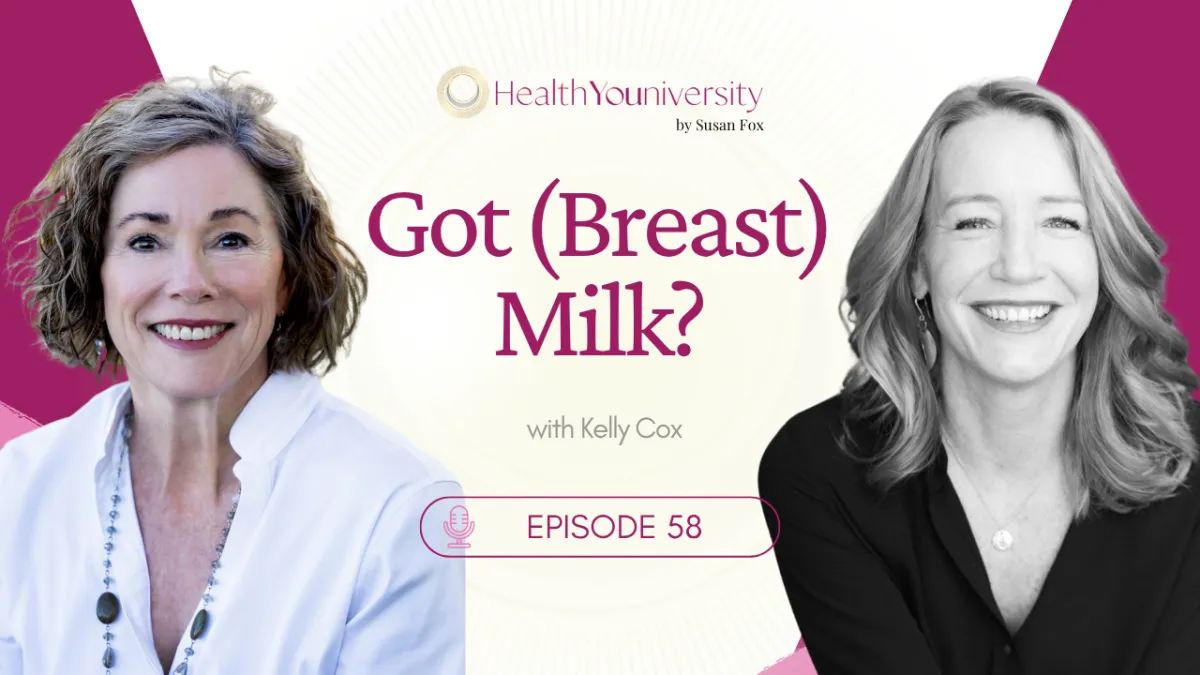
Milk Sharing, Access & Community | Blog | HealthYouniversity
When families face challenges with breastfeeding and formula shortages, access to breast milk can be a huge stressor in infant care. While breast milk is widely recognized as the gold standard for infant nutrition, not all parents are able to produce milk for their babies. And as formal milk banks serve the most critical needs, everyday families don’t always have an accessible or timely solution.
In a recent episode of Health Youniversity, clinical social worker and breast cancer survivor Kelly Cox introduced her app, Share the Drop, a peer-to-peer platform designed to connect breast milk donors and recipients in real-time. By streamlining an age-old practice through modern technology, she is doing more than improving access — she’s reimagining how families nourish their babies and support one another.
Infant Feeding and Parental Stress
For many new parents, feeding can be emotionally taxing. When breastfeeding doesn’t go as planned, whether due to low supply, medical conditions, or postpartum complications, families can feel guilt, anxiety, and isolation. While formula is a vital and valid option, it isn’t always aligned with parents’ preferences or readily available.
The pressure to breastfeed, paired with limited alternatives, has created a gap in care. Kelly Cox, who has supported families for over 15 years, saw firsthand how lack of access to breast milk impacted mothers’ mental health and infant nutrition and knew a better system was needed.
Gaps in Donor Milk Access
Formal milk banks follow strict medical screening and pasteurization processes, making them essential for high-risk infants, especially in neonatal intensive care units (NICUs). However, these systems aren’t designed for everyday families who may need a few ounces to get through a low-supply period or feed a foster or surrogate-born baby.
Access can be uneven. Most milk banks are concentrated in larger metro areas and require large donations, excluding small-scale donors who still want to help.
Technology for Community Milk Sharing
To close this access gap, Share the Drop offers a digital platform that enables safe, efficient, and local milk sharing. Using zip code-based matching, families in need of milk can connect directly with nearby donors. The app streamlines the entire process - Kelly describes it as being similar to a ride-sharing or a dating app, but for human milk.
Rather than relying on clunky forums or time-consuming message boards, Share the Drop provides real-time notifications and user profiles that help recipients and donors find each other easily. It’s not just about convenience — it’s about rebuilding community-centered care.
Ethics and Safety in Informal Exchange
Informal milk sharing comes with valid concerns: safety, transparency, and the ethics of milk donation. Share the Drop addresses these through clear boundaries and informed consent. The app prohibits milk sales entirely, preventing exploitation and maintaining the integrity of the exchange.
Each user completes a profile that may include dietary habits, lifestyle factors, and willingness to share medical information. Donors and recipients are encouraged to communicate openly, ask questions, and meet in safe, public spaces. It’s a trust-based system with built-in features like user reporting and donor verification options designed to empower parents to make the best decision for their babies.
Real-Life Stories and Shared Support
Behind the platform are powerful stories. A grandmother raising her incarcerated daughter’s baby received donated milk from a local family. A mother grieving the stillbirth of her child found healing by donating her stored milk. A breast cancer survivor used milk from six different donors to feed her newborn via surrogate. These exchanges go beyond nutrition; they offer comfort, solidarity, and a sense of being held by a larger village. Milk sharing becomes a source of emotional nourishment as much as physical, helping parents know they’re not alone.
Expanding Access Through Local Networks
Share the Drop isn’t just an app; it's a model for scaling grassroots care. With nationwide availability and subscription options that are waived for WIC- and SNAP-eligible users, it removes logistical and financial barriers. A "Feed It Forward" program allows users or supporters to sponsor access for others, helping sustain the platform and extend its reach.
In a time when many parents feel disconnected and unsupported, Share the Drop is using simple tech to revive an old tradition — feeding the next generation together.
Listen to the Full Episode here:
Or watch the Vodcast on YouTube
Detox to De-Stress: View the FREE Masterclass on the importance of detoxification to prepare for a healthy pregnancy: https://susanfox1.easywebinar.live/gentle-detox
Know the status of your fertility health. Take our FREE Fertility Quiz now: https://healthyouniversity.co/fertility-quiz
Fulfill your dream of a family. Know your best options for a healthy pregnancy:https://www.healthyouniversity.co/programs
Boost Employee Productivity by Investing in their Fertility Health. Check out our Corporate Wellness program and know the benefits it can bring to your company:https://www.healthyouniversity.co/corporate-wellness
Kelly Cox, LCSW, RPYT, and certified birth doula, is the founder of Share the Drop, a community-based platform transforming access to breast milk through peer-to-peer donation. With over 15 years of experience supporting families through pregnancy, postpartum recovery, and infant feeding, she draws from her clinical background and personal journey as a breast cancer survivor to champion more equitable, connection-driven solutions in early parenthood.
Website: https://sharethedrop.com/
Medical Disclaimer:
By listening to the Health Youniversity podcast, you agree not to use this podcast as medical advice to treat any medical condition for yourself or others. Consult your healthcare provider for any medical issues you may have. This entire disclaimer also pertains to any guests or contributors to any Health Youniversity podcast.
